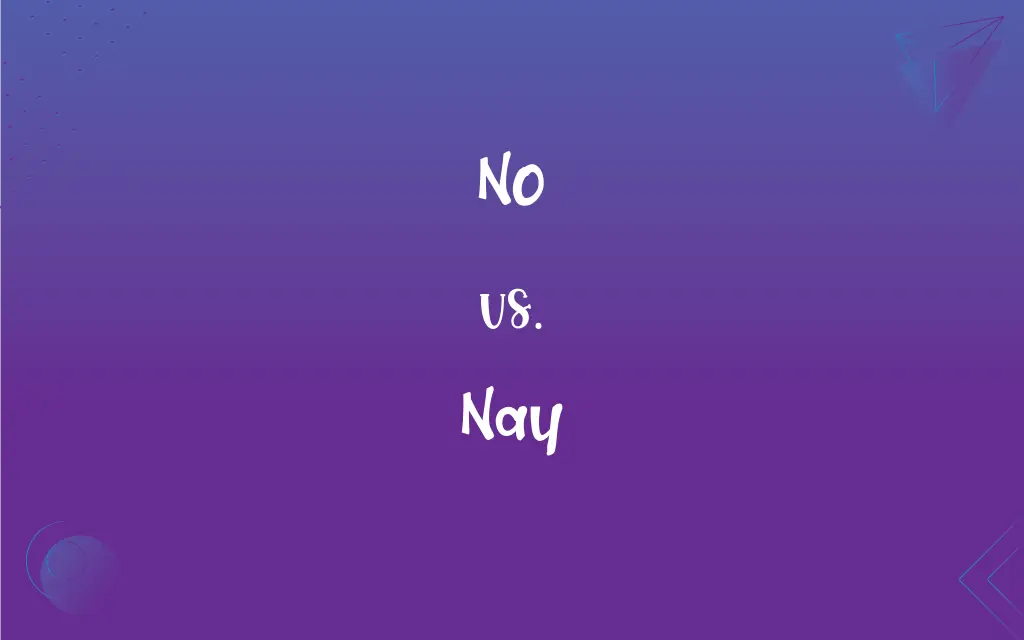No vs. Nay: What's the Difference?
Edited by Janet White || By Harlon Moss || Updated on November 7, 2023
"No" is a negation typically used in modern English, while "nay" is an archaic or formal term for "no."

Key Differences
In the English language, "no" is a commonly used negation word, signaling refusal or disagreement. In contrast, "nay" is an archaic term that also means refusal but is seldom used in contemporary English. While "no" is universally understood in English-speaking cultures today, "nay" may not be immediately recognized by all English speakers due to its rarity in modern usage.
The word "no" is derived from the Old English "na," which means not ever or not at all. "Nay" also comes from the Old English "næġ," which has a similar meaning but was used in slightly different contexts. Over time, "no" has become the standard form for negation, while "nay" has largely fallen out of use except in historical or stylistic contexts.
In grammar, "no" functions as an adverb, adjective, noun, and interjection, fitting into various sentence structures easily. "Nay," however, is primarily used as an adverb or interjection and has a more limited grammatical role. This limited use is one reason "nay" has diminished in popularity compared to the more versatile "no."
Regarding usage, "no" is the go-to choice in modern conversation and writing, serving as the negative response to yes-no questions. "Nay" is now often found in historical novels, period films, or in certain dialects, such as Scottish or Northern English, maintaining a sense of antiquity or regional identity.
In phonetic terms, both "no" and "nay" share the 'n' sound but differ in their vowel sounds, with "no" having a long 'o' and "nay" containing a long 'a'. This difference in pronunciation is minor but contributes to the distinct feel of each word when spoken aloud.
ADVERTISEMENT
Comparison Chart
Current Usage
Commonly used
Rarely used outside of historical context
Grammatical Role
Adverb, adjective, noun, interjection
Adverb, interjection
Origin
Old English "na"
Old English "næġ"
Pronunciation
Long 'o' sound
Long 'a' sound
Contemporary Use
Standard negation in modern English
Used for stylistic, historical effect
ADVERTISEMENT
No and Nay Definitions
No
"No" as absence.
There's no milk left in the fridge.
Nay
"Nay" as denial (historical).
Nay, the land belongs to no man.
No
"No" as refusal.
I said no to the extra work.
Nay
"Nay" as contradiction.
You say it's true, but I say nay.
No
"No" as disagreement.
No, I don't agree with that point.
Nay
"Nay" as refusal.
Nay, I shall not attend the feast.
No
"No" as denial.
There are no exceptions to the rule.
Nay
"Nay" as disagreement (poetic).
Nay, the night is not for sorrow.
No
"No" as prohibition.
No smoking in the building.
Nay
"Nay" as rejection (dialectical).
Nay, lad, that won't do.
No
Variant of Noh.
Nay
No
All but four Democrats voted nay.
No
A negative response; a denial or refusal
The proposal produced only noes.
Nay
And moreover
He was ill-favored, nay, hideous.
No
A negative vote or voter.
FAQs
Is "nay" still commonly used in English?
No, "nay" is considered archaic and is rarely used in modern English.
Is "no" a complete sentence?
Yes, "no" can function as a complete sentence when used as a response.
Do "no" and "nay" have the same origin?
Yes, both have roots in Old English but have evolved differently.
Can "no" be used as an adjective?
Yes, "no" can modify nouns, as in "no sugar."
Can "no" and "nay" be used interchangeably?
No, "no" is used in contemporary language, while "nay" is typically used for historical or stylistic effect.
Is "nay" a formal version of "no"?
No, "nay" is not more formal; it's just archaic.
Why is "nay" less common than "no"?
Because "nay" has a more limited grammatical role and old-fashioned connotation.
Are there contexts where "nay" is preferred over "no"?
Nay, except in historical contexts or for stylistic purposes, "no" is preferred.
Can "nay" be used in poetry?
Yes, "nay" is sometimes used in poetry for its archaic quality.
Does "nay" appear in modern dialects?
Yes, but it's limited to certain regional dialects.
Is "no" used differently in British and American English?
No, its use is consistent between the two.
Do "no" and "nay" sound the same?
No, they differ in vowel sounds.
Can "no" function as a noun?
Yes, as in "The number of nos outnumbered the yeses."
Are there songs or idioms that use "nay"?
Yes, but they are usually traditional or historical.
Is "nay" used in modern legislation or formal documents?
No, modern documents use "no" for negation.
Can "nay" be an interjection?
Yes, "nay" can be an exclamation, though it's old-fashioned.
Is it correct to use "nay" in everyday conversation?
No, it would sound outdated and possibly confusing.
Is "no" an adverb?
Yes, "no" can modify verbs, adjectives, and other adverbs.
Is "no" used internationally?
Yes, "no" is recognized in all English-speaking countries.
Does "nay" appear in Shakespeare's works?
Yes, "nay" is often used in Elizabethan literature.
About Author
Written by
Harlon MossHarlon is a seasoned quality moderator and accomplished content writer for Difference Wiki. An alumnus of the prestigious University of California, he earned his degree in Computer Science. Leveraging his academic background, Harlon brings a meticulous and informed perspective to his work, ensuring content accuracy and excellence.
Edited by
Janet WhiteJanet White has been an esteemed writer and blogger for Difference Wiki. Holding a Master's degree in Science and Medical Journalism from the prestigious Boston University, she has consistently demonstrated her expertise and passion for her field. When she's not immersed in her work, Janet relishes her time exercising, delving into a good book, and cherishing moments with friends and family.































































